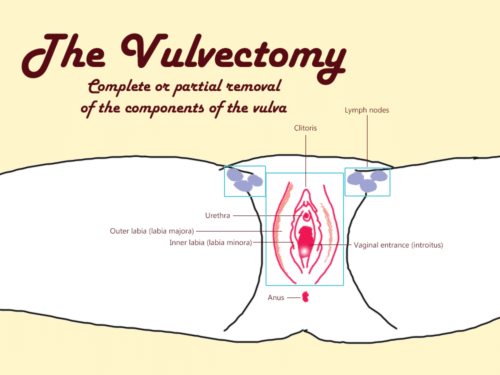Squamous cell vulvar cancer
Squamous cell vulvar cancers are becoming less lethal as treatments improve.
Vulvar cancers
Vulvar cancers are reasonably rare for the most part, but usually get diagnosed late, making vulvar cancer more deadly than it ought to be. Vulva cancer may be innocuous in its symptoms, which makes regular pelvic exams more important than ever, especially as we age.
Vulvar or vaginal melanoma
Vulvar and vaginal melanoma is a rare form of gynaecological cancer affecting the melanin-producing cells under our skin, the melanocytes. Melanomas tend to be pigmented spots on the skin that look unusual, but we can easily miss them on our vulva or vagina.
Chemotherapy and your vagina, ovaries, uterus and cervix
Chemotherapy in your pelvis can have a few unexpected or uncomfortable impacts on your vagina, urinary tract, and hormones.
Vulvar intraepithelial neoplasia (VIN) (SIL, Bowen disease)
We explain what precancerous vulvar cells are, and describe their symptoms, treatments, and outcomes. Vulval intraepithelial neoplasia (VIN) is the starting point of cancerous cells, with a diagnosis meaning you may have to have some treatment to remove the offending cells. It does not mean you have cancer.
Paget’s disease of the vulva
Paget's disease of the vulva is a rare form of vulvar cancer that develops from glandular cells. Paget's looks like a rash, red velvet with small white or pink 'islands' on vulvar tissue that may ooze or bleed. Paget's is often itchy and sore. Prognosis can be good if found
The vulvectomy
Vulvectomy is the surgical removal of all or parts of the vulva, as part of treating a disease that has not responded to other treatments. A vulvectomy is a serious operation where the inner and outer labia, clitoris, and lymph nodes of the groin are removed.
Pelvic radiation therapy
Having radiation therapy on your pelvis can cause some unwelcome problems that can linger, like a dry, thickened vaginal wall, lack of moisture, and lack of flexibility.


